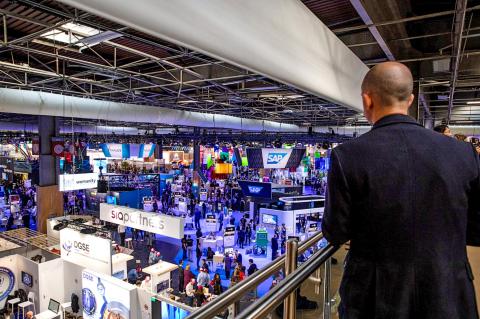A Taiwanese start-up developer of a positioning system for uncrewed vehicles has secured a US$5 million purchase order at a conference in France, the Ministry of Science and Technology said yesterday, expressing the hope that Taiwan and France will continue to deepen technological collaboration.
According to its Web site, the Viva Technology conference, which was held in Paris from Thursday until yesterday, attracted nearly 9,000 start-ups from around the world and 1,900 investors.
Deputy Minister of Science and Technology Hsu Yu-chin (許有進) on Wednesday led a delegation of 10 local enterprises to the biggest start-up expo in Europe, the ministry said in a statement.

Photo: Bloomberg
It was the first time the ministry set up a national pavilion at an important start-up gathering in Europe, it said.
The iTech team led by National Taiwan University Graduate Institute of Communication Engineering professor Mao Shau-gang (毛紹綱) secured the purchase order from a French electric car maker on the first day of the expo, the ministry said.
The team combined Mao’s accumulated research on metamaterials and antennae with communication techniques and artificial intelligence (AI) to develop positioning systems for uncrewed aerial vehicles and self-driving cars, an institute newsletter said.
The delegation also included developers of a virtual-reality camera, an AI-based automotive assistant, a precise blood measurement technology and a driver fatigue monitoring system, the ministry said.
The ministry in June last year inaugurated the Taiwan Tech Arena incubator in Taipei, which has cultivated more than 100 start-ups, Hsu said at the launch of Taiwan’s pavilion on Thursday.
France is Taiwan’s second-largest technological partner and relations between the two nations have continued to deepen since President Tsai Ing-wen (蔡英文) took office in 2016, Representative to France Wu Chih-chung (吳志中) was quoted as saying by the ministry.
Taiwanese airlines purchased 14 A350 passenger jets from Airbus’ France-based civil airplane business two years ago, 17 more aircraft last year and an additional 29 jets last week, Wu said, adding that Taiwanese and French start-ups are also expected to increase collaboration.
The delegation also received an invitation from the Luxembourg Ministry of the Economy and Foreign Trade to attend the global ICT Spring tech conference on Tuesday and Wednesday, the science ministry said.

MAKING WAVES: China’s maritime militia could become a nontraditional threat in war, clogging up shipping lanes to prevent US or Japanese intervention, a report said About 1,900 Chinese ships flying flags of convenience and fishing vessels that participated in China’s military exercises around Taiwan last month and in January last year have been listed for monitoring, Coast Guard Administration (CGA) Deputy Director-General Hsieh Ching-chin (謝慶欽) said yesterday. Following amendments to the Commercial Port Act (商港法) and the Law of Ships (船舶法) last month, the CGA can designate possible berthing areas or deny ports of call for vessels suspected of loitering around areas where undersea cables can be accessed, Oceans Affairs Council Minister Kuan Bi-ling (管碧玲) said. The list of suspected ships, originally 300, had risen to about

DAREDEVIL: Honnold said it had always been a dream of his to climb Taipei 101, while a Netflix producer said the skyscraper was ‘a real icon of this country’ US climber Alex Honnold yesterday took on Taiwan’s tallest building, becoming the first person to scale Taipei 101 without a rope, harness or safety net. Hundreds of spectators gathered at the base of the 101-story skyscraper to watch Honnold, 40, embark on his daredevil feat, which was also broadcast live on Netflix. Dressed in a red T-shirt and yellow custom-made climbing shoes, Honnold swiftly moved up the southeast face of the glass and steel building. At one point, he stepped onto a platform midway up to wave down at fans and onlookers who were taking photos. People watching from inside

Japan’s strategic alliance with the US would collapse if Tokyo were to turn away from a conflict in Taiwan, Japanese Prime Minister Sanae Takaichi said yesterday, but distanced herself from previous comments that suggested a possible military response in such an event. Takaichi expressed her latest views on a nationally broadcast TV program late on Monday, where an opposition party leader criticized her for igniting tensions with China with the earlier remarks. Ties between Japan and China have sunk to the worst level in years after Takaichi said in November that a hypothetical Chinese attack on Taiwan could bring about a Japanese

The WHO ignored early COVID-19 warnings from Taiwan, US Deputy Secretary of Health and Human Services Jim O’Neill said on Friday, as part of justification for Washington withdrawing from the global health body. US Secretary of State Marco Rubio on Thursday said that the US was pulling out of the UN agency, as it failed to fulfill its responsibilities during the COVID-19 pandemic. The WHO “ignored early COVID warnings from Taiwan in 2019 by pretending Taiwan did not exist, O’Neill wrote on X on Friday, Taiwan time. “It ignored rigorous science and promoted lockdowns.” The US will “continue international coordination on infectious